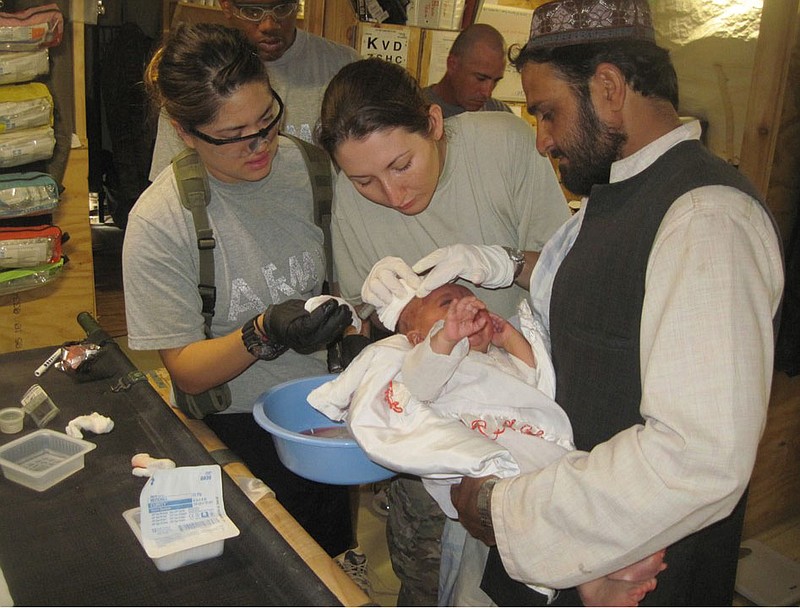It's the rare combat veteran who will say that war is anything but terrible, but some also say they miss it. They don't miss the maiming and death of battle, but some do miss its simplicity and intensity. One Vietnam veteran dying of diseases caused by the defoliant Agent Orange told me that the conflict in Southeast Asia had destroyed his life, and yet it was also the most awesome thing he ever experienced. A Korean War veteran told me in a Zoom conversation that combat was horrific, yet he spoke from a basement filled with war relics he had collected and possessed with fondness.
A scene near the end of the film "The Hurt Locker" gets at this. A former soldier who had dismantled explosives in Iraq is standing in a grocery store's cereal aisle, bewildered by the array of choices. His world of war had offered much simpler, much clearer and much more meaningful options. The film ends with him back in Iraq walking toward a mine to be deactivated.
There are lots of stories. A Marine's 20-year career ended soon after the toppling of Saddam Hussein's regime in 2003. When he left Iraq, he believed the country had a bright future. Then came the insurgency, the improvised explosive devices, the chaos and the political divide here at home.
An Army medic and a JBU alumna showed me pictures of herself cradling babies in Afghanistan and patching up Afghan kids hurt in accidents and fights. She worked long hours and cared, but she never felt that the hearts and minds of the locals were winnable.
The world of war is unique and its lessons aren't easily transferable to civilian life. But one theme does seem applicable. For all its awfulness, something that makes combat meaningful is a common cause, a common fight. For ground combatants in Vietnam, this involved not only struggle against a clever and persevering enemy, but also against the elements -- monsoon rains, breath-drowning heat and humidity, snakes, insects and thorns. There are few things that can bring different people together more quickly and devotedly than a common threat.
The threat every American faces at the moment is the possibility of the country literally falling to pieces. The Wall Street Journal recently printed a newspaper article from late 1876. Then as now, a sharply divided nation faced a bitterly controversial presidential election and its aftermath. The article included the line that "no wrong could be so monstrous as the kindling of civil war." This wouldn't be very noticeable if talk of revolution, even of civil war, weren't now common -- if destructive impulses weren't growing on the left and right -- if our social media feeds weren't so full of rancor. A country can't continue like this and be stable.
The actual breakdown of the United States would amount to one of the most consequential events of human history -- akin to the unraveling of the Roman Empire in the early fifth century. Did the Roman Empire have many problems? Yes. Was there much to complain about? Yes. Did the Empire's unraveling lead to things far worse? Yes -- that string of centuries called the "Dark Ages."
Such is the threat facing us all, and also the world. Canada, Mexico and many other countries depend on the United States. The momentary pleasure that comes with plunging another virtual knife into an opponent on Facebook isn't worth the accumulating costs.
This has been long in the making. In 2015 a perceptive friend in Guatemala asked me if the U.S. were in the slow process of breaking apart. Some Vietnam veterans think we're seeing the continuation of a culture war that began in the late 1960s and early '70s.
We'll either be united as separate tribes in a cultural death struggle, or we'll be united against the threat of a drawn-out national dissolution that faces us all.
A local combat veteran told me of an incident where a young soldier drank someone else's fruit juice. It would be a minor thing at one of our elementary schools, but in the heat and squalor of a Vietnamese jungle when absolute trust was needed, that ethical breach jeopardized the unit and its mission. The squad leader used words to address the situation, but his more important move was a deed. He gave the stolen-from soldier his own fruit drink. It was an act of peace in a context of struggle.
Maybe there's a lesson for us in that story.
-- Preston Jones lives in Siloam Springs and oversees the website "War & Life: Discussions with Veterans." The opinions expressed are those of the author.

